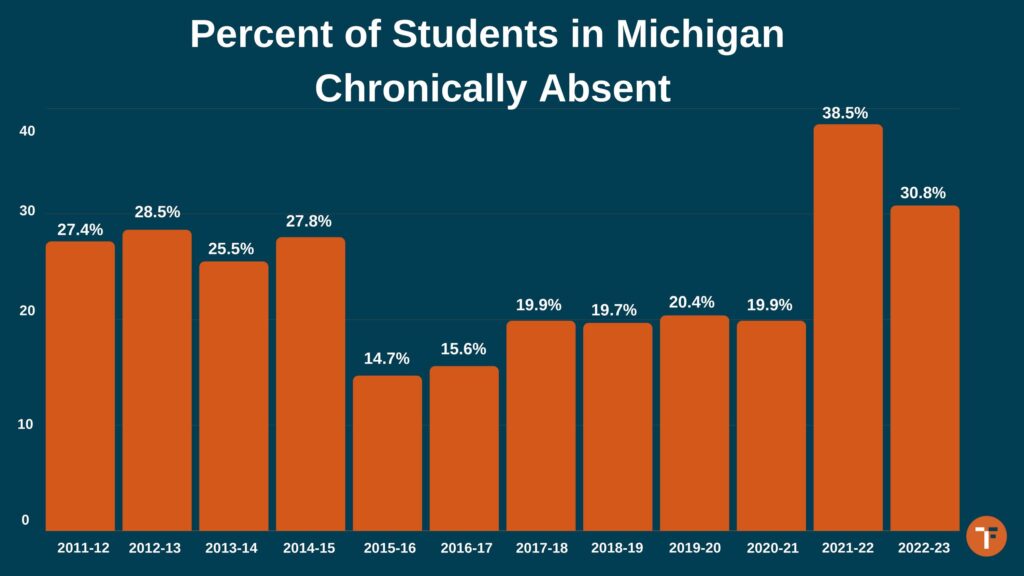Employer Guide to Promoting School Attendance
Why Attendance Matters to Business Leaders
Attending school regularly is essential for students to gain the academic, social and emotional skills they need to thrive. Chronic absence — when a student misses 10% or more of the school year, or about 18 days per year or 2-3 days per month — has real-life consequences for students, families and society. Research shows that, starting as early as preschool and kindergarten, chronic absence can leave third graders unable to read proficiently, sixth graders struggling with coursework and high school students off track for graduation.
Chronic absenteeism — which includes all types of absences, such as excused, unexcused, and suspensions — remains a serious problem in Michigan and is a major contributor to the state’s early literacy crisis. In TalentFirst’s ongoing work with West Michigan educators to develop strategies to improve third-grade reading levels, we consistently heard that when kids miss class, reading instruction suffers.
This can be solved when the whole community, including employers, plays a part.
Attendance Works: A Community Imperative Video
To download the video, click here
How Absenteeism Hurts Students
If a student misses 2 days a month, they will miss 20 days a year. They will also miss:
- 30 hours of math per year
- 60 hours of reading and writing per year
- 1 year of school by the time they graduate
Michigan currently has the 7th highest chronic absenteeism rate in the nation, according to a new analysis by the Associated Press and The Detroit News

A Priority for West Michigan Business Leaders
In this video message, DeWys Metal Solutions CEO Jon DeWys explains how the CEOs of TalentFirst are stepping forward and collaborating with our K12 partners to combat the crisis of chronic absenteeism.
West Michigan business leaders have a long history of collaborating with K-12 leaders to ensure our region’s children get the education they need to thrive. This is another opportunity for an important partnership. Chronic absence is a problem we can solve, especially if business leaders work with schools, parents and communities to improve student attendance.
Why this is an important issue for business leaders:
- The workforce challenge: Absenteeism contributes to high school dropout rates, leaving students without the academic credentials and skills needed to compete in a 21st century workforce.
- The soft skills challenge: Regular attendance is the precursor to the “soft skills” that you will continue to expect and require. Students who don’t develop the habits associated with good attendance in the early years will find it difficult to develop them as adults.
- The productivity challenge: Children who are sick miss school. And their parents miss work. As employers, you have a real stake in reducing the numbers of days that children stay home due to preventable illnesses.
Action Steps for Business Leaders
1. Nurture a Culture of Attendance
Educate your own employees about the importance of good school attendance.
1. Share these handouts with your staff:
- Elementary Attendance (English PDF & Spanish PDF)
- Middle & High School Attendance (English PDF & Spanish PDF)
- When is sick too sick for school? (English PDF & Spanish PDF)
2. Share this video with your employees: Bringing Attendance Home: Parent Video (English & Spanish )
3. Put up a poster promoting good attendance in your breakroom or office window. (English PDF & Spanish PDF)


2. Connect Learning to the Workplace
Research has shown that when students connect their learning to the workplace through work-based learning experiences, they tend to be more engaged in school and have improved attendance. How employers can help:
- Offer various work-based-learning experiences such as job shadowing, internships, apprenticeships and workplace tours.
- Participate in classroom activities such as informational interviews, guest lectures, or career talks to inspire and guide students in exploring careers in your industry.
- Create flexible schedules for students so they can attend school as well as work part-time.
- Partner with schools and districts to offer alternative career paths that allow students to earn credit as well as gain valuable work experience.